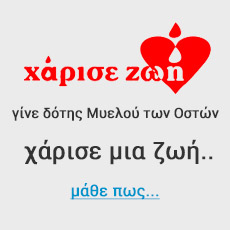Λίστα αντικειμένων
Best Abstract award in EBMT 2020, Madrid
O066 - FLAMSA-BASED REDUCED INTENSITY CONDITIONING VERSUS MYELOABLATIVE CONDITIONING IN PATIENTS WITH RELAPSED/REFRACTORY ACUTE MYELOID LEUKEMIA WITH ACTIVE DISEASE AT THE TIME OF TRANSPLANTATION: AN ALWP/EBMT ANALYSIS
Eduardo Rodríguez-Arbolí1, Myriam Labopin2, Johanna Tischer3, Arne Brecht4, Arnold Ganser5, Jürgen Finke6, Igor Wolfgang Blau7, Nicolaus Kröger8, Peter Kalhs9, Edouard Forcade10, Donald Bunjes11, Alexandros Spyridonidis12, Bipin Savani13, Arnon Nagler14, Mohamad Mohty15
Background: Allogeneic stem cell transplantation (alloSCT) remains a necessary requirement for long-term survival in patients with relapsed/refractory (R/R) acute myeloid leukemia (AML). A significant proportion of R/R AML patients undergo an alloSCT in the absence of disease response, and conditioning choice for this patient population is controversial. The use of myeloablative conditioning (MAC) in this setting has been limited by high non-relapse mortality (NRM), and sequential FLAMSA followed by reduced-intensity conditioning (RIC) has been proposed as an effective and safer alternative. As improvements in supportive care contribute to decreasing NRM rates after MAC, a reassessment of these two strategies is warranted.
Methods: This was a retrospective registry-based analysis performed by the ALWP of the EBMT. Eligibility criteria included age 18-50 years, primary refractory, first or second relapsed active AML, first alloSCT from a matched sibling donor (MSD) or an unrelated donor (UD) performed between 2005 and 2018, MAC with cyclophosphamide and total body irradiation (Cy/TBI) or busulfan/cyclophosphamide (Bu/Cy), or FLAMSA-RIC. The study endpoints were overall survival (OS), relapse incidence (RI), leukemia-free survival (LFS), non-relapse mortality (NRM), acute graft-versus-host disease (aGVHD), chronic graft-versus-host disease (cGVHD) and refined graft-versus-host disease, relapse-free survival (GRFS). Cox proportional hazards regression models (cause-specific for competing risk data) were constructed for all outcome measures.
Results: A total of 1018 patients were included. Median age was 39 (range 18-50) years. Two hundred fifty-eight patients received Bu/Cy, 314 Cy/TBI, 318 FLAMSA-TBI and 128 FLAMSA-chemotherapy without TBI (CT). Bu/Cy (53%) was the most common regimen among patients receiving FLAMSA-CT, followed by melphalan (17%) and Bu (14%). Patients in the MAC group were more likely to have received an alloSCT from a MSD (39% vs. 30% and 24% in the FLAMSA-TBI and FLAMSA-CT groups, p< 0.01), and less likely to have received ATG (32% vs. 87% and 84%, p< 0.01). There were no significant differences in the distributions of Karnofsky performance status, cytogenetic risk, secondary AML or disease status at transplantation. Median follow-up was 50.2 months.
In univariate analysis, 2-year RI (54% [95% CI: 50-57]), LFS (30% [95% CI: 27-33]) and GRFS (21% [95% CI: 18-24]) were not significantly different between cohorts. Lower 2-year NRM was observed in the FLAMSA-CT group (7% vs. 16% in Bu/Cy, 19% in Cy/TBI and 18% in FLAMSA-TBI; p=0.04), as well as increased 2-year OS (50% vs. 33% in Bu/Cy, 34% in Cy/TBI and 36% in FLAMSA-TBI; p=0.03). These results were maintained in the multivariate analysis (HR for NRM: 0.41, p=0.01; HR for OS: 0.67, p=0.01; Bu/Cy as reference). Conditioning regimen had no impact on grade II-IV aGVHD (35% [95% CI: 32-38]) or 2-year extensive cGVHD (12% [95% CI: 10-15]). Additionally, adverse cytogenetics and second relapse status were associated with an increase in RI and lower OS in the multivariate model.
Conclusions: MAC or FLAMSA-TBI resulted in similar outcomes among patients with R/R AML with active disease at the time time of alloSCT. FLAMSA-CT was associated with reduced NRM, leading to an OS benefit as compared with MAC and FLAMSA-TBI.
Disclosure: Nothing to declare.
Methods: This was a retrospective registry-based analysis performed by the ALWP of the EBMT. Eligibility criteria included age 18-50 years, primary refractory, first or second relapsed active AML, first alloSCT from a matched sibling donor (MSD) or an unrelated donor (UD) performed between 2005 and 2018, MAC with cyclophosphamide and total body irradiation (Cy/TBI) or busulfan/cyclophosphamide (Bu/Cy), or FLAMSA-RIC. The study endpoints were overall survival (OS), relapse incidence (RI), leukemia-free survival (LFS), non-relapse mortality (NRM), acute graft-versus-host disease (aGVHD), chronic graft-versus-host disease (cGVHD) and refined graft-versus-host disease, relapse-free survival (GRFS). Cox proportional hazards regression models (cause-specific for competing risk data) were constructed for all outcome measures.
Results: A total of 1018 patients were included. Median age was 39 (range 18-50) years. Two hundred fifty-eight patients received Bu/Cy, 314 Cy/TBI, 318 FLAMSA-TBI and 128 FLAMSA-chemotherapy without TBI (CT). Bu/Cy (53%) was the most common regimen among patients receiving FLAMSA-CT, followed by melphalan (17%) and Bu (14%). Patients in the MAC group were more likely to have received an alloSCT from a MSD (39% vs. 30% and 24% in the FLAMSA-TBI and FLAMSA-CT groups, p< 0.01), and less likely to have received ATG (32% vs. 87% and 84%, p< 0.01). There were no significant differences in the distributions of Karnofsky performance status, cytogenetic risk, secondary AML or disease status at transplantation. Median follow-up was 50.2 months.
In univariate analysis, 2-year RI (54% [95% CI: 50-57]), LFS (30% [95% CI: 27-33]) and GRFS (21% [95% CI: 18-24]) were not significantly different between cohorts. Lower 2-year NRM was observed in the FLAMSA-CT group (7% vs. 16% in Bu/Cy, 19% in Cy/TBI and 18% in FLAMSA-TBI; p=0.04), as well as increased 2-year OS (50% vs. 33% in Bu/Cy, 34% in Cy/TBI and 36% in FLAMSA-TBI; p=0.03). These results were maintained in the multivariate analysis (HR for NRM: 0.41, p=0.01; HR for OS: 0.67, p=0.01; Bu/Cy as reference). Conditioning regimen had no impact on grade II-IV aGVHD (35% [95% CI: 32-38]) or 2-year extensive cGVHD (12% [95% CI: 10-15]). Additionally, adverse cytogenetics and second relapse status were associated with an increase in RI and lower OS in the multivariate model.
Conclusions: MAC or FLAMSA-TBI resulted in similar outcomes among patients with R/R AML with active disease at the time time of alloSCT. FLAMSA-CT was associated with reduced NRM, leading to an OS benefit as compared with MAC and FLAMSA-TBI.
Disclosure: Nothing to declare.
Presenter: Prof.Spyridonidis
Participants: Dr Liga, Dr Spyridis, Dr Fragopanagou, Dr Lekka, Dr Kostopoulou

